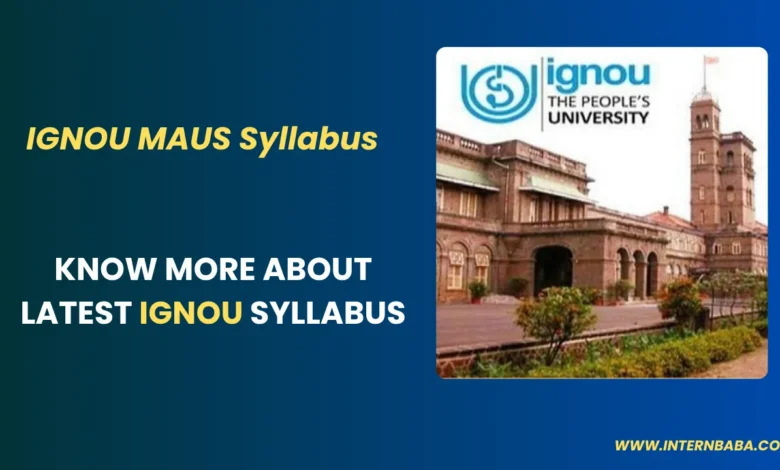IGNOU MAUS Syllabus 2025

If you’re planning to pursue the Master of Arts in Urban Studies (MAUS) from Indira Gandhi National Open University (IGNOU), understanding the syllabus is a crucial first step. Whether you’re a fresher exploring postgraduate options or a working professional aiming to upskill, knowing the course structure, credit requirements, and subject layout will help you make informed academic decisions. In this guide, we bring you a detailed and updated overview of the IGNOU MAUS Syllabus for 2025. We’ll break down the credit system, list all the core and elective subjects, and offer insights to help you plan your studies efficiently.
IGNOU’s MAUS program is designed to give students an in-depth understanding of urban development, planning, and policy frameworks. This two-year annual program follows a credit-based structure that ensures flexibility and academic balance. The curriculum is tailored for individuals interested in careers related to urban governance, city planning, sustainable development, and public policy.
IGNOU MAUS 2025 Program Overview
The IGNOU MAUS (Master of Arts in Urban Studies) program offers a comprehensive academic structure suited for learners from diverse backgrounds. The program is structured to accommodate both theoretical foundations and practical applications of urban studies. Here are the key highlights:
| Component | Details |
|---|---|
| Program Name | Master of Arts (Urban Studies) |
| Exam System | Annual |
| Total Credits Required | 64 |
| Program Category | IGNOU MAUS |
The curriculum is broken into core subjects in the first year, followed by electives and advanced core subjects in the second year. Students can select from a pool of elective courses, depending on availability.
IGNOU MAUS Current Syllabus 2025
Below is the breakdown of courses offered under the MAUS program for the 2025 academic session:
First Year Courses
These are foundational subjects intended to provide a strong base in urban studies:
| Course Code | Course Name | Credits |
| MEDS-041 | Introduction to Urban Development | 6 |
| MEDS-042 | Issues and Challenges in Urban Planning and Development | 6 |
| MEDS-043 | Dynamics of Urban Planning and Development | 6 |
| MEDS-044 | Monitoring and Evaluation of Projects and Programmes | 6 |
Elective (Choose any one)
Students must choose one elective from the following list:
| Course Code | Course Name | Credits |
| MEDSP-045 | Project Work | 8 |
| MEDSE-046 | Development: Issues and Perspectives | 8 |
Second Year Courses (Choose any 32 credits)
Students can customize their academic path by choosing from the following electives in the second year:
| Course Code | Course Name | Credits |
| MEDS-047 | Ecology, Environment and Urban Development | 8 |
| MEDS-048 | Sustainable Development and Smart Cities | 8 |
| MEDS-049 | Dynamics of Development in Urban Construct | 8 |
| MHI-10 | Urbanization in India | 8 |
| MPA-016 | Decentralization and Local Governance | 8 |
Total Program Credits: 64
Understanding the IGNOU MAUS Credit System
The IGNOU MAUS program is designed on a flexible credit system, which allows students to pace their learning while achieving academic goals. One credit is generally equivalent to 30 hours of study, including academic activities and self-study.
To earn the MAUS degree, a student must accumulate a total of 64 credits:
- First Year: 24 credits from four core subjects.
- Electives: 8 credits from one elective.
- Second Year: 32 credits chosen from the pool of five available subjects.
This modular credit system benefits students by allowing flexibility and manageable workloads. It also makes it easier for students who may need to pause and resume their studies due to personal or professional commitments.
Why Choose IGNOU MAUS Program?
There are several advantages to enrolling in the IGNOU MAUS program, especially for students interested in urban planning and development:
- Flexible Learning: The distance learning model suits working professionals and students with time constraints.
- Cost-Effective: IGNOU offers quality education at a fraction of the cost of private universities.
- Updated Curriculum: Courses are revised regularly to reflect current issues in urban development and governance.
- Diverse Career Options: Graduates can work in NGOs, policy think tanks, municipal corporations, or pursue research.
- Recognition: IGNOU is a UGC-recognized institution, and its degrees are valid for both public and private employment.
Key Skills You Will Gain
- Urban planning and development analysis
- Environmental and sustainability assessment
- Governance and decentralization practices
- Policy evaluation and project monitoring
- Interdisciplinary research skills
Study Tips for IGNOU MAUS Students
- Plan Your Calendar: Keep track of assignment deadlines, exam dates, and credit progress.
- Utilize Study Material: IGNOU provides excellent printed and online resources. Use these materials thoroughly.
- Join Student Forums: Connect with fellow students via forums or social media groups for guidance and motivation.
- Consult Tutors: Make use of academic counselling sessions provided by regional centers.
- Work on Past Papers: Solve previous years’ question papers to get a grip on the exam pattern.
Frequently Asked Questions (FAQs)
Q1. What is the duration of the IGNOU MAUS program?
The MAUS program is designed to be completed over two years, but students can take up to five years as per IGNOU’s flexible learning policies.
Q2. How many total credits are required to complete the MAUS degree?
Students must complete a total of 64 credits to earn the MAUS postgraduate degree.
Q3. Can I change my elective after registration?
In most cases, electives cannot be changed once registered. It is recommended to consult your study centre before finalizing your elective.
Q4. Are all elective subjects offered every academic year?
Not always. The availability of electives depends on IGNOU’s scheduling and course offering for that year.
Q5. Is the MAUS degree from IGNOU recognized for employment?
Yes, the MAUS degree is recognized by the University Grants Commission (UGC) and is valid for both government and private sector employment.
Final Thoughts
The IGNOU MAUS Syllabus 2025 offers a robust, flexible, and industry-relevant academic framework for students interested in urban development. With its mix of theory, practical knowledge, and policy-oriented courses, the program equips learners with the tools needed to contribute meaningfully in urban planning and governance sectors. Whether you’re aiming for a career in research, planning, consultancy, or public service, this program provides the academic foundation to help you achieve your goals.
For updates regarding syllabus revisions, admissions, or assignment schedules, students are advised to regularly visit the official IGNOU website or contact their regional centres.







